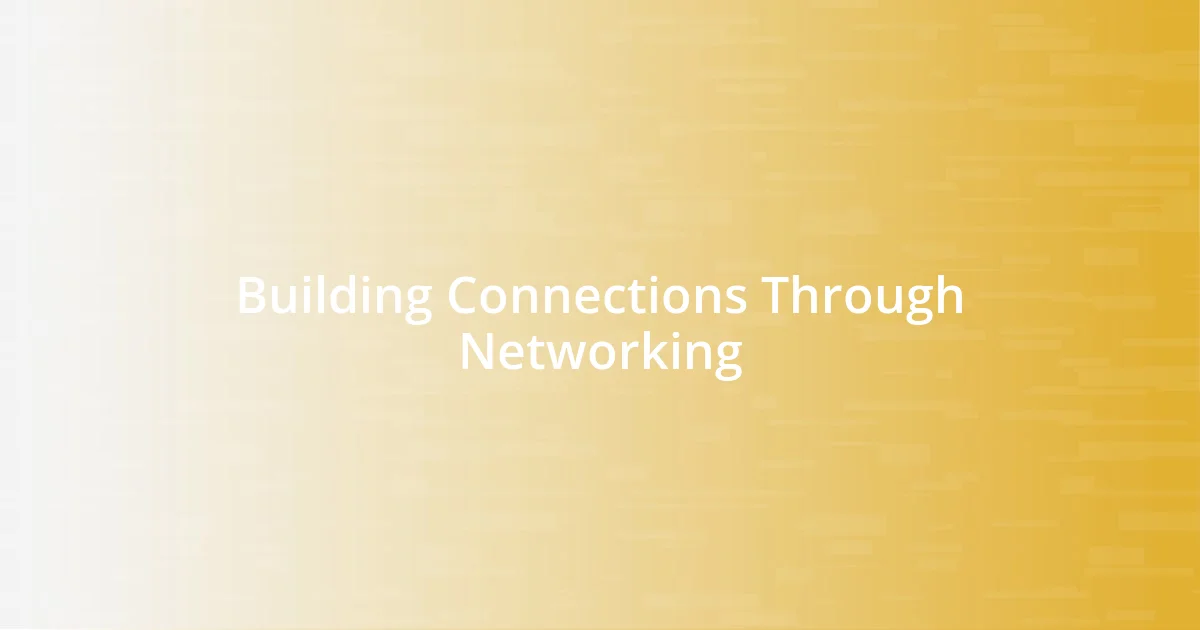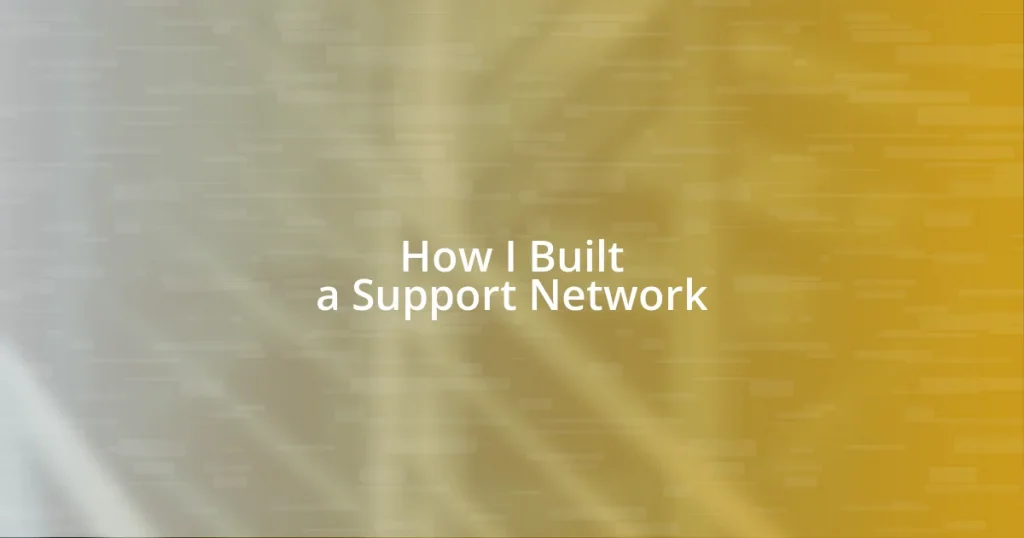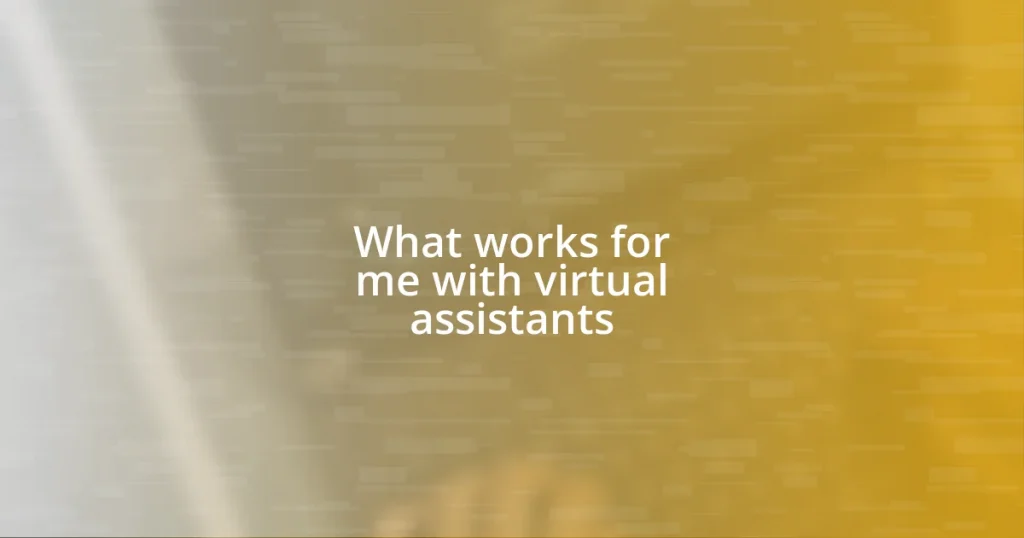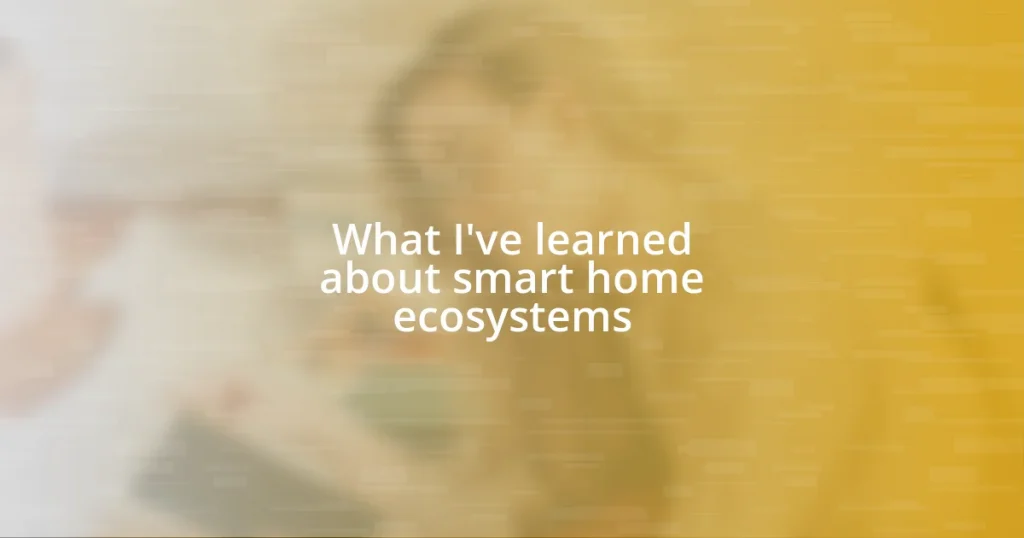Key takeaways:
- Identify your support needs through self-reflection, categorizing them as emotional, practical, or informational to find the right connections.
- Build relationships by networking with individuals who share experiences and perspectives, and prioritize genuine listening and follow-up to strengthen bonds.
- Regularly evaluate and maintain your support network, being open to positive changes and nurturing relationships that contribute to your personal growth.

Identifying Your Support Needs
Identifying your support needs starts with self-reflection. I remember sitting alone on a quiet evening, realizing that I often felt overwhelmed but wasn’t sure what kind of help I truly needed. This moment of clarity compelled me to jot down my feelings—something that may resonate with you. Have you ever paused to consider what specific kinds of support would lift your spirits?
Sometimes, it’s helpful to break down your needs into categories: emotional, practical, or informational support. I distinctly recall struggling with a work project and feeling drained. It wasn’t just feedback I sought; I needed encouragement and someone to share my experiences with. This realization helped me seek connections that were not only professional but also personal, reminding me that support can take many forms.
As you reflect on your own requirements, consider what energizes you. Do you thrive with a friend who cheers you on or someone who helps strategize? Each individual’s needs differ, and that’s perfectly okay. For me, finding a blend of support types has been transformative in my journey, turning feelings of isolation into a community of encouragement. What transforms your struggle into strength? That’s where your support needs lie.

Finding the Right People
Finding the right people to build your support network can feel like searching for hidden treasures. I remember when I attended a local workshop focused on self-improvement. Surprisingly, I connected with a few kindred spirits who shared tales of their struggles. Those moments illuminated how vital it is to surround myself with people who resonate on the same frequency—individuals who not only understand my challenges but also offer genuine encouragement and insight.
To identify the right connections, consider these aspects:
- Shared Experiences: Look for people who’ve faced similar challenges; their insights can be invaluable.
- Diverse Perspectives: Engage with those from varying backgrounds—different viewpoints can enrich your understanding and approach.
- Positive Energy: Seek out individuals who uplift you rather than drain your energy. Their presence can make a world of difference.
- Willingness to Listen: Find people who are genuinely interested in your story and willing to share theirs; mutual support is crucial for growth.
- Commitment to Growth: Surround yourself with those who are also invested in personal development, as this fosters an environment of accountability and inspiration.
I’ve found that true connection often comes from shared passions. For instance, while participating in a local running group, I stumbled across friendships that blossomed over shared goals. It’s remarkable how a common interest can lay the groundwork for deeper relationships, reinforcing the idea that support networks thrive on understanding and camaraderie.

Building Connections Through Networking
Building a strong support network requires intentional effort and genuine connection. I’ve often found that networking is not just about exchanging business cards; it’s about forging relationships that resonate. I remember meeting a colleague at a casual coffee meet-up. We started discussing our professional journeys, and before I knew it, we were sharing personal growth stories. That day made me realize that building connections is about making space for vulnerability and openness—two foundational stones for meaningful relationships.
Listening plays an equally crucial role in networking. There have been instances when I attended a community event, where I was drawn to someone speaking passionately about their experiences. I approached them and simply listened. Sharing that moment of connection turned into an insightful discussion about mutual challenges. It taught me that by truly listening, you’re not only showing respect but also inviting people to share their journeys, which can lead to unexpected support and guidance.
I can’t stress enough the importance of follow-up in networking. After establishing a connection, I often send a simple message to check in, share an article that may interest them, or invite them for another chat. This transformed a casual encounter into a potential ongoing relationship. Networking thrives on consistency, and small gestures can build lasting trust and camaraderie.
| Type of Connection | Personal Anecdote |
|---|---|
| Emotional Connection | Shared personal stories foster trust. |
| Professional Insights | Listening leads to valuable guidance. |
| Consistency | Following up strengthens relationships. |

Engaging in Mutual Support
Engaging in mutual support is like standing on a two-way street, where both sides benefit from the traffic of understanding and encouragement. I recall a time when a friend reached out to me during a particularly challenging phase in her career. Our heart-to-heart conversation not only helped her navigate her struggles but also allowed me to reflect on my own experiences, reinforcing that mutual support is truly a give-and-take dynamic. When have you leaned on someone for support, only to find it empowering you in unexpected ways?
In my view, accountability plays a fundamental role in mutual support. For instance, I partnered with a couple of friends to set fitness goals; we’d check in with each other weekly. Knowing someone else was counting on me transformed my approach to exercise. The commitment to each other’s progress bred a sense of responsibility that made achieving our goals not just personal, but a shared accomplishment. How might holding each other accountable shift your perspective in your support network?
Emotional growth thrives in the nurturing soil of mutual support. There was a moment when I shared my fears about pursuing a new career path with a group I trusted. Their reactions were overwhelmingly positive, offering suggestions and sharing their own uncertainties. This exchange created a safe space where we all felt validated, and it reminded me that by sharing our vulnerabilities, we cultivate deeper connections. Isn’t it incredible how simply being authentic can spark a chain reaction of support?

Creating a Safe Communication Space
Creating a safe communication space is vital for fostering authentic connections. I vividly remember a group meeting where, instead of diving straight into business, we started with a round of personal highs and lows. This simple practice of sharing created an atmosphere where vulnerability was welcomed, making it easier for everyone to express their true feelings without fear of judgment. Have you ever found that openness invites deeper conversations?
During another experience, I learned the importance of setting clear boundaries for conversations. There was a time when a colleague shared something deeply personal, and without thinking, I began offering solutions. Instead of my intended support, she needed a listening ear. That moment taught me that sometimes, being there means resisting the urge to fix things and just allowing space for someone to express themselves fully. How would you feel if someone simply listened without trying to solve your problems?
I also emphasize the significance of non-verbal communication in creating a safe space. One day, while having a candid chat with a friend, I noticed how her body language relaxed as I maintained eye contact and nodded in understanding. This small act of showing empathy encouraged her to share even more. It reminded me how our presence—both verbal and non-verbal—can make or break how safe someone feels in communicating. Think about the last time you felt truly heard; what nuances contributed to that feeling?

Maintaining Your Support Network
The heart of maintaining a support network lies in consistent communication. I’ve found that simple check-ins, even just a quick text or a coffee catch-up, make a world of difference. When one of my friends went through a difficult divorce, regular chats not only showed my support but also kept our connection strong. How often do you reach out to loved ones just to ask how they are doing?
It’s important to be proactive about nurturing relationships. I remember being part of a book club that met once a month. Over time, those book discussions evolved into more profound conversations about life challenges. This consistent engagement deepened our bonds and let us discover layers of support we hadn’t tapped into before. Can you think of ways you could integrate regular gatherings into your support system?
I deeply believe in the power of gratitude in maintaining a robust support network. One time, I wrote heartfelt notes to each member of my close-knit group, expressing how much their support meant to me. The reaction was heartwarming; it created a ripple effect of appreciation that brought us all closer. How might recognizing and acknowledging the efforts of those in your circle uplift not just them, but your relationship as well?

Evaluating and Adjusting Your Network
When evaluating your support network, I find it’s crucial to reflect on the quality of those connections. I recently realized that a friendship, which once provided mutual encouragement, had become a source of stress for me due to constant negativity. Have you ever felt drained after spending time with someone? Recognizing this allowed me to step back and reassess how that relationship fit into my life.
Another aspect of evaluation is being open to change. I recall a time when I triaged my connections after an intense period of self-reflection following a personal challenge. I expanded my network by reaching out to individuals who inspired me, shedding relationships that no longer served my emotional well-being. How does your support network reflect your current values and goals?
Adjusting your network doesn’t always mean pruning; sometimes it involves breathing new life into existing connections. For instance, I started suggesting more uplifting activities with a long-time friend who was in a rut. We began taking weekend hikes together, and it opened a channel for more positive conversations. Isn’t it remarkable how an activity can transform the entire dynamics of a relationship?















